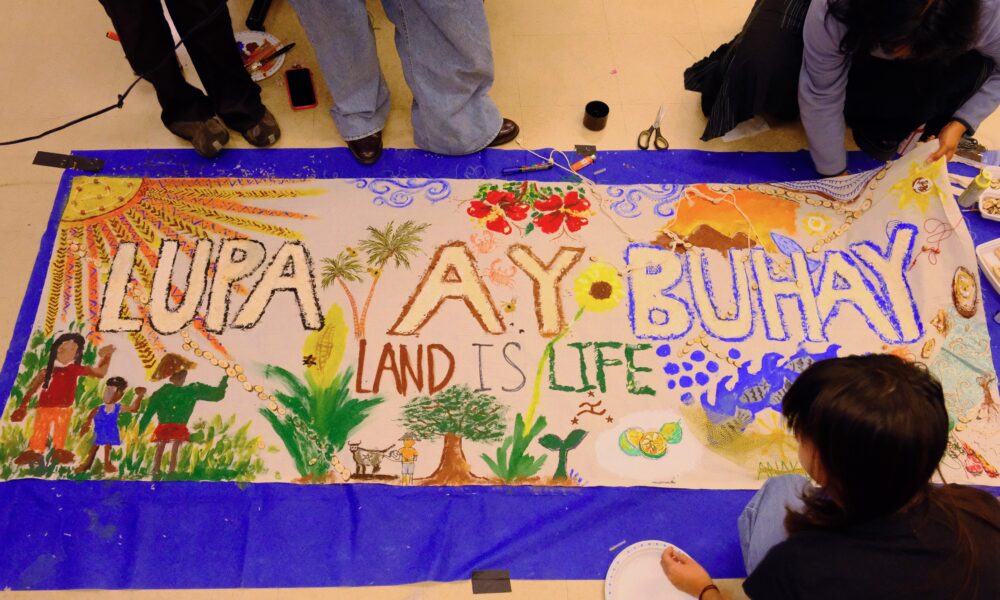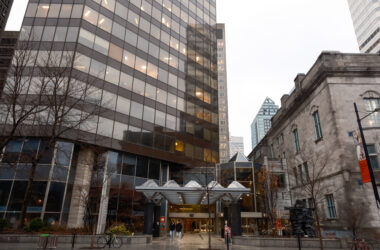The Quebec Public Interest Research Group’s (QPIRG) 2024 Culture Shock series concluded on Oct. 29 with the “Lupa Ay Buhay” (Land is Life) Teach-In, led by the Filipino youth group Anakbayan Montreal. Anakbayan’s work—as a chapter of an international Filipino National Democratic Front organization—includes several youth engagement and education programs, with a focus on “connecting Canadian issues to the homeland.” QPIRG has collaborated with Anakbayan for several years, as the organization was a part of QPIRG’s working group program.
The first half of the workshop, led by former Anakbayan member Fatima Barron, provided background on the peasant struggle in the Philippines, and Canada’s relationship to the issue as an imperialist country. Filipino peasants are farmers, fisherfolk, and agricultural workers who produce most of the country’s food, yet the majority of peasants do not own the land they till and struggle to afford food. A legacy of Spanish colonialism, this semi-feudal system is maintained by the United States through neoliberal economic policy. Peasants face high land rent, high interest rates on loans for seeds and fertilizer, land grabbing from landlords or multinational corporations, and the criminalization of peasant leaders.
Barron noted how Canadian mining harms Philippine land and communities by degrading the environment and displacing Indigenous communities. She also drew attention to the exploitative conditions affecting Filipino migrant workers in Canada’s Temporary Foreign Worker Program. Employers often underpay or deny pay to workers, and may prevent them from seeking support.
Barron’s knowledge of the topic comes, in part, from experience learning from peasant communities. She spent four months in the peasant community of Lupang Tartaria, Philippines, in the spring of 2024 as part of one of Anakbayan’s “exposure trips”—opportunities meant to facilitate a deeper understanding of social conditions in the Philippines. While there, armed personnel were reportedly building barricades on farmers’ agricultural land, prompting peasants to fight back.
The event drew in both Filipino and non-Filipino participants, something that, for Barron, added to its effectiveness.
“When I was in the Philippines, people [were] so happy to see Filipinos abroad and non-Filipinos caring about issues in the Philippines. It provides them a sense of motivation to show them that they’re not alone in their fight,” Barron said.
During the event, Barron also highlighted the importance of arts and culture in Tartarian resistance and community building, bridging the connection between participants and farmers in Tartaria through the decoration of a banner reading “Lupa ay Buhay” (“Land is Life”). While introducing the project, she noted how participants benefit as consumers of peasant labour, which produces many essential products for Canadians such as rice. Attendees added a variety of materials to the banner, including rice, string, and fabric. Others painted scenes that the presentation brought up for them.
Barron explained that Anakbayan Montreal’s inclusion of art as a part of the teach-in aligns with their political goals as a National Democratic organization.
“Art is a vehicle to put forward ideas,” Barron said. “Anyone can make art, and everyone should be encouraged to [….] It’s also important to break down the idea that art is only for the few and the talented.”
Joliz Dela Peña, a member of Anakbayan, said that having a collective activity enriched the educational aspect of the workshop.
“The banner-making activity truly inspired us to collaborate, and it was fun to meet youth that support these types of actions [in] this way,” Dela Peña said.
Providing alternative learning spaces like the one created in the teach-in is a key part of QPIRG’s work. According to Lola Milder, the Campus Outreach Coordinator at QPIRG, the organization’s Culture Shock programming has seen a record turnout due to an increasing number of students’ disillusionment with traditional education.
“There is an increasing distrust in the places we’ve gotten knowledge [as students] in the past, and people are realizing that what we’ve learned [in traditional school spaces] might not be accurate,” Milder said. “It makes people turn out.”
Barron also attested to the importance of learning environments beyond school walls.
“What’s beautiful about spaces like this is learning [how] we are not alone and that there’s a broader movement of peoples fighting for change,” Barron said.









